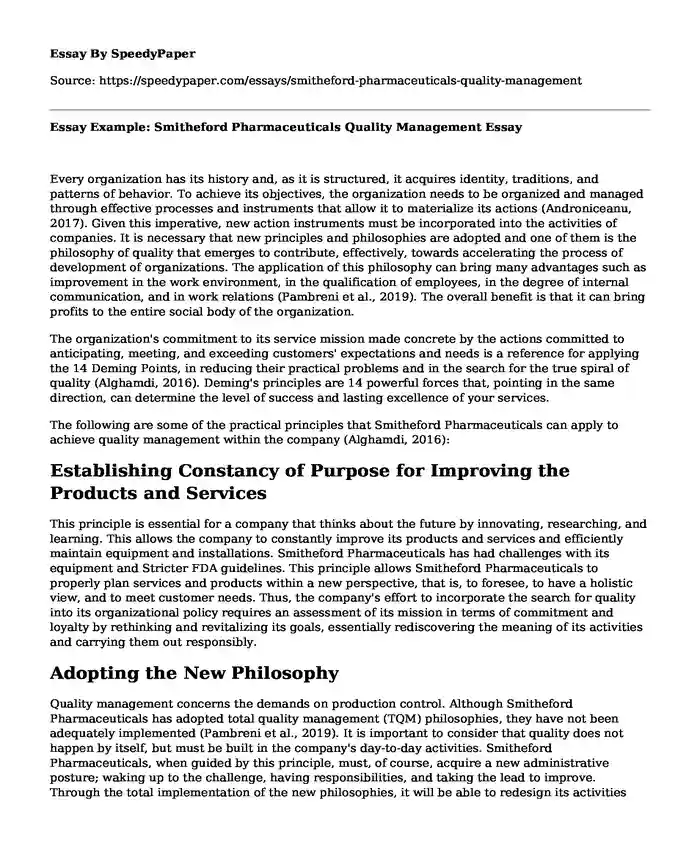
| Essay type: | Rhetorical analysis essays |
| Categories: | Organizational culture Leadership style Leadership management |
| Pages: | 3 |
| Wordcount: | 714 words |
Every organization has its history and, as it is structured, it acquires identity, traditions, and patterns of behavior. To achieve its objectives, the organization needs to be organized and managed through effective processes and instruments that allow it to materialize its actions (Androniceanu, 2017). Given this imperative, new action instruments must be incorporated into the activities of companies. It is necessary that new principles and philosophies are adopted and one of them is the philosophy of quality that emerges to contribute, effectively, towards accelerating the process of development of organizations. The application of this philosophy can bring many advantages such as improvement in the work environment, in the qualification of employees, in the degree of internal communication, and in work relations (Pambreni et al., 2019). The overall benefit is that it can bring profits to the entire social body of the organization.
The organization's commitment to its service mission made concrete by the actions committed to anticipating, meeting, and exceeding customers' expectations and needs is a reference for applying the 14 Deming Points, in reducing their practical problems and in the search for the true spiral of quality (Alghamdi, 2016). Deming's principles are 14 powerful forces that, pointing in the same direction, can determine the level of success and lasting excellence of your services.
The following are some of the practical principles that Smitheford Pharmaceuticals can apply to achieve quality management within the company (Alghamdi, 2016):
Establishing Constancy of Purpose for Improving the Products and Services
This principle is essential for a company that thinks about the future by innovating, researching, and learning. This allows the company to constantly improve its products and services and efficiently maintain equipment and installations. Smitheford Pharmaceuticals has had challenges with its equipment and Stricter FDA guidelines. This principle allows Smitheford Pharmaceuticals to properly plan services and products within a new perspective, that is, to foresee, to have a holistic view, and to meet customer needs. Thus, the company's effort to incorporate the search for quality into its organizational policy requires an assessment of its mission in terms of commitment and loyalty by rethinking and revitalizing its goals, essentially rediscovering the meaning of its activities and carrying them out responsibly.
Adopting the New Philosophy
Quality management concerns the demands on production control. Although Smitheford Pharmaceuticals has adopted total quality management (TQM) philosophies, they have not been adequately implemented (Pambreni et al., 2019). It is important to consider that quality does not happen by itself, but must be built in the company's day-to-day activities. Smitheford Pharmaceuticals, when guided by this principle, must, of course, acquire a new administrative posture; waking up to the challenge, having responsibilities, and taking the lead to improve. Through the total implementation of the new philosophies, it will be able to redesign its activities and processes; simplify them, streamline them and make them more effective, to identify and satisfy the needs of its customers.
Instituting Training and Retraining
This principle refers to the fundamentals of training management and new employees. Training should always be instituted in the company, to avoid wasting knowledge and efforts. Training is an instrument of personal development. The challenge that this function faces is precisely to reconcile the personal and professional needs of the worker with the stated objectives of the organization. Smitheford Pharmaceuticals has experienced challenges in implementing TQM which may be attributed to inadequate training. Training is indispensable for the implementation of quality management (van Kemenade & Hardjono, 2019). Therefore, Smitheford Pharmaceuticals must train their employees through appropriate methodologies, enabling their capacity for critical thinking and teamwork before assigning them responsibility for a position. Training should make them understand company policies and the needs of their customers.
References
Alghamdi, H. (2016). Toward Better Understanding of Total Quality Management (TQM). Journal of Business & Economic Policy, 3(4), 29-37. http://www.jbepnet.com/journals/Vol_3_No_4_December_2016/5.pdf
Androniceanu, A. (2017). The three-dimensional approach of Total Quality Management is an essential strategic option for business excellence. Amfiteatru Economic, 19(44), 61-78. http://hdl.handle.net/10419/169057
Pambreni, Y., Khatibi, A., Azam, S., & Tham, J. (2019). The influence of total quality management toward organization performance. Management Science Letters, 9(9), 1397-1406. doi: 10.5267/j.msl.2019.5.011
van Kemenade, E., & Hardjono, T. W. (2019). Twenty-first-century total quality management: the emergence paradigm. The TQM Journal. https://www.emerald.com/insight/content/doi/10.1108/TQM-04-2018-0045/full/html
Cite this page
Essay Example: Smitheford Pharmaceuticals Quality Management. (2023, Oct 29). Retrieved from https://speedypaper.com/essays/smitheford-pharmaceuticals-quality-management
Request Removal
If you are the original author of this essay and no longer wish to have it published on the SpeedyPaper website, please click below to request its removal:
- Education Essay Sample: Hardships Faced in the College Journey
- Lateness Research, Free Essay in Time Management
- Cultural Competence in Global Society - Essay Sample for Students
- Essay Example on Leadership and Leadership Development
- Free Essay Providing a Leadership Style Reflection
- Essay Example: Working in Teams and Effective Meeting
- Essay Sample on Strategies to Overcome the Challenges Faced by the Emiratis in the Airlines
Popular categories




